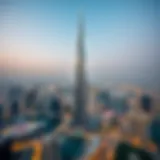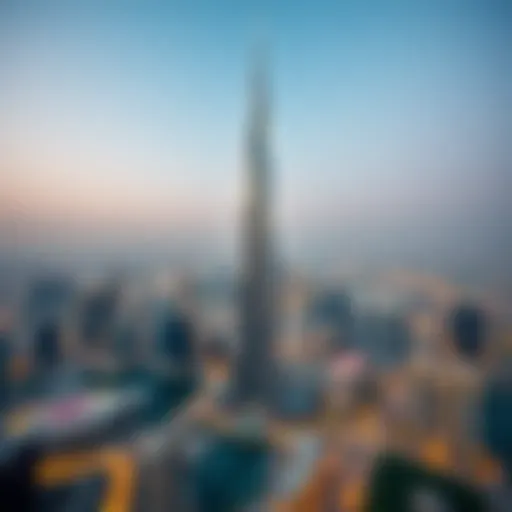Exploring the Smart City Innovations of Dubai


Intro
As one of the leading global cities, Dubai stands as a beacon of innovation, integrating cutting-edge technology with urban living. This shift towards becoming a smart city has not only redefined the landscape of its infrastructure but also transformed the daily lives of its residents and businesses. With a focus on sustainability, connectivity, and efficiency, Dubai's smart city initiative embodies a vision that is both ambitious and practical.
In this article, we will dissect the various elements contributing to Dubai's journey as a smart city, focusing on emerging market trends, investment insights, and the overarching implications for stakeholders at every level. The smart city concept stretches beyond mere technological advancements; it encapsulates a holistic approach to urban planning that promotes a higher quality of life and fosters economic growth.
Understanding the dynamics of Dubai's smart city initiatives is essential for investors, real estate professionals, expatriates, and homeowners alike. Through comprehensive analysis, the article aims to provide actionable insights and a roadmap for navigating the evolving landscape of this vibrant metropolis.
Market Trends
Current Market Analysis
In recent years, Dubai's real estate sector has been caught in a whirlwind of activity driven by its smart city agenda. The integration of artificial intelligence and the Internet of Things in urban infrastructure is shaping a unique market landscape. This shift is evident in smart homes that offer intelligent energy management and security systems, enhancing both comfort and sustainability.
Moreover, the presence of economic diversification agendas, like the Dubai Economic Agenda, is an underlying trend. Key sectors such as technology, tourism, and transportation are becoming increasingly interconnected, paving the way for enhanced collaboration among businesses. The emergence of start-ups, particularly in tech, is seeing incubators and accelerators spring up across the city, drawing in talent and investment from around the globe.
This creates a fertile ground for investment opportunities, offering a blend of growth potential and stability for savvy investors.
Future Predictions
Looking ahead, the smart city framework in Dubai is expected to adapt continuously to emerging technologies and changing societal needs. Analysts predict a further rise in demand for smart living spaces, integrating eco-friendly technologies into everyday life. Improvements in transport infrastructure, such as autonomous vehicles and smart public transport, will likely reshape commuting, making it more efficient and less time-consuming.
As sustainability remains a focal point, the development of renewable energy projects and green spaces will play pivotal roles in urban planning. This transformation not only addresses environmental concerns but also aligns with the preferences of an increasingly environmentally conscious population.
Investors are advised to keep a close eye on these trends as they unfold, as they present opportunities that could reshape the financial landscape of Dubai.
Investment Insights
Best Areas for Investment
When considering investment in Dubai's real estate market, it is crucial to pinpoint the areas primed for growth. Districts such as Dubai Marina, Downtown Dubai, and Jumeirah Lake Towers are rapidly evolving, thanks to their strategic locations and innovative developments. Emerging areas like Dubai Creek Harbour and Dubai South are also gaining momentum, driven by futuristic projects that promise to redefine city living.
For instance, Dubai Creek Harbour is set to be home to the world's tallest building, enhancing its status as an attractive destination for both investors and residents.
Tips for First-Time Investors
Embarking on investment in a city as dynamic as Dubai can be daunting. Here are some practical tips for first-time investors:
- Research Thoroughly: Understand the market trends, be aware of regulatory requirements, and know the area's real estate values.
- Evaluate Infrastructure Projects: Pay attention to new developments and government initiatives that can affect property value.
- Consider End-Use: Determine whether the property is for personal use or rental income—each has distinct best practices.
- Consult Local Experts: Engaging with real estate agents familiar with the local market can provide valuable insights.
By following these guidelines and maintaining a keen eye on investment trends, aspiring investors can navigate the complexities of Dubai's evolving market confidently.
Preface to Dubai's Smart City Concept
Dubai stands at the forefront of modernization and innovation, turning itself into a beacon of what a smart city can entail. This transformation is more than just a collection of high-tech gadgets and flashy buildings; it’s a holistic approach to urban life, intricately weaving technology into the fabric of daily existence. This segment of the article will unpack the foundations of this concept, illustrating why understanding Dubai's smart city strategy is essential not only for residents but for investors and stakeholders eager to engage with its dynamic market.
Given the rapid urbanization that is sweeping through the world, cities are pressured to adapt and innovate to maintain livability while fostering economic growth. Dubai’s smart city initiative positions itself as a model where technology meets operational efficiency—creating an urban ecosystem that enhances the quality of life.
Definition of a Smart City
A smart city is often characterized by its use of digital technology to enhance performance across various sectors, including transportation, energy, and public services. It garners its intelligence primarily from data gathered via sensors and connected devices embedded throughout urban areas. This information then fuels decision-making processes that aim at improving service delivery and efficiency.
In the case of Dubai, the term encompasses multiple dimensions. From ensuring efficient energy consumption to implementing smart transportation systems, a smart city blends physical infrastructure and innovative solutions harmoniously. Consider the way GPS technologies are integrated to monitor traffic patterns in real time, or how building management systems regulate energy usage based on occupancy – these are but a few examples that breathe life into the concept of a smart city.
Dubai's Vision and Goals
Dubai’s journey towards becoming a smart city is encapsulated in its strategic vision—crafted meticulously to respond to both present demands and future aspirations. The emirate launched the Dubai Smart City Strategy in 2014, aligning its technological pursuits with the UAE Vision 2021, targeting a holistic transformation that caters to the needs of its fast-growing population.
Some key elements of this strategy include:
- Sustainability: Emphasizing renewable energy sources, the aim is to achieve a sustainable environment that reduces carbon footprint.
- Connectivity: Developing robust digital infrastructure ensures that both businesses and residents enjoy seamless connectivity at all times.
- Economic Diversification: By fostering a landscape ripe for innovation, Dubai seeks to minimize its dependency on oil revenues.
Ultimately, the vision is to create a city that not only meets the needs of its inhabitants but also sets a benchmark for other global metropolises. In meeting these ambitious goals, Dubai emphasizes inclusivity, ensuring that both locals and expatriates have a stake in the transformation process.
"In the heart of Dubai, technology and tradition coexist, creating a future that respects its past while pushing the boundaries of what a city can be."
By delving deeper into these foundational concepts of Dubai's smart city initiative, the subsequent sections will elucidate the technological infrastructure supporting this transformation—and how smart services revolutionize life in this vibrant metropolis.
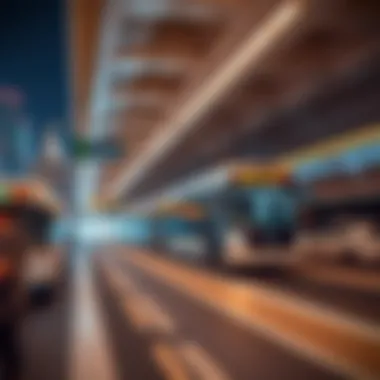

Technological Infrastructure in Dubai
In a world increasingly driven by technology, Dubai has adopted a forward-thinking stance, placing emphasis on advanced technological infrastructure as the bedrock of its smart city ambitions. This infrastructure not only enhances the efficiency and convenience of urban living but also opens avenues for economic growth. A strong tech backbone ensures that Dubai remains competitive on the global stage, attracting investors and tech-savvy individuals eager to harness the potential of innovative technologies. As smart cities continue to evolve, Dubai's approach provides a promising model that other cities may look to emulate.
Smart Transportation Systems
Autonomous Vehicles
Autonomous vehicles represent a pivotal element of Dubai's transportation landscape. These self-driving cars hold the promise to revolutionize urban mobility by improving safety and efficiency. One compelling trait of autonomous vehicles is their ability to reduce traffic congestion, effectively addressing one of the major pain points of city living. With Dubai's commitment to innovation, these vehicles can be integrated seamlessly into the current infrastructure.
However, there are considerations at play. While the potential for reduced accidents is a significant advantage, the implementation of autonomous technology comes with challenges. Issues like regulatory approvals and public acceptance could hinder their widespread adoption. Despite these hurdles, the benefits often outweigh the downsides, making autonomous vehicles a prominent focus in discussions about Dubai's smart city framework.
Public Transport Innovations
Public transport innovations in Dubai signify a blend of tradition and modernity. The introduction of smart buses, enhanced metro services, and even aerial taxis point toward a future where public transit is not just a necessity but a desirable choice. This innovation enhances accessibility, especially for residents and visitors navigating the city's vast expanse.
A unique feature of public transport innovations in Dubai is the integration of real-time tracking systems. This technology allows passengers to receive live updates on transit schedules via mobile applications, drastically increasing user convenience. Yet, transitioning to fully automated systems raises its own set of challenges, such as ensuring that these systems are user-friendly while also guaranteeing safety and efficiency. Overall, the public transport advancements in Dubai herald a shift toward a more connected and responsive urban transport ecosystem.
Digital Connectivity
Telecommunications Networks
The backbone of Dubai's digital transformation lies in its robust telecommunications networks. Ensuring residents and businesses remain connected is a priority that has manifested in widespread initiatives to enhance mobile and broadband infrastructure. A standout characteristic of these networks is their focus on high-speed connectivity, crucial for fostering innovation in a tech-driven society.
Moreover, a high-quality telecommunications network facilitates the mobilization of smart applications across various sectors, including healthcare and education. However, with great speed must come responsibility; maintaining robust cybersecurity measures is vital to protect sensitive information as the city becomes more interconnected. Thus, while the benefits of advanced telecommunications are clear, the challenges of safeguarding user data cannot be neglected.
Wi-Fi Access Initiatives
Wi-Fi access initiatives in Dubai reflect a dedicated effort to promote digital literacy and connectivity among residents and visitors. One of the key features of these initiatives is the provision of free, high-speed Wi-Fi in public spaces such as malls, parks, and beaches. This strategic move not only enhances the experience for tourists but also supports local communities by providing necessary online access.
However, extending Wi-Fi access to all areas is a work in progress. The challenges include ensuring network reliability and security, but the city's commitment to increasing access demonstrates its understanding of modern digital needs. As these initiatives continue to grow, they will contribute significantly to the fabric of daily life in Dubai, fostering greater engagement and bridging the digital gap.
Urban Planning and Development
In the context of Dubai's evolution into a smart city, urban planning and development play a pivotal role. This aspect ensures that the growing population can thrive comfortably while maintaining harmony with technological innovations and sustainable practices. By focusing on the synergy between the urban environment and technological advancements, Dubai aims to enhance quality of life for its residents and foster economic growth.
A key element of urban planning in Dubai is the integration of sustainably focused developments. As urban density increases, embracing sustainable development goals is not a mere option but rather a necessity. This includes careful planning of residential areas, business districts, and public spaces that balance the needs of diverse stakeholders. Every corner of Dubai's urban landscape is scrutinized, ensuring that as the city expands, it does so in a manner that is both responsible and progressive.
Sustainable Development Goals
Renewable Energy Implementations
Renewable energy implementations are a backbone in advancing Dubai's sustainable aims. The city's focus on harnessing solar energy is significant, given its geographical advantages. By investing in solar parks, like the Mohammed bin Rashid Al Maktoum Solar Park, Dubai aims to produce 75% of its energy from renewable sources by 2050. This initiative not only contributes to reducing the overall carbon footprint but also solidifies Dubai’s position as a leader in renewable energy within the region.
One distinguishing feature of such implementations is the commitment to intertwining technology with environmental sustainability. The use of smart grids plays a critical role in optimizing energy consumption, providing real-time data to users, which encourages mindful usage of resources. However, predicting energy needs is still a challenge. As the demand grows, the spotlight is on ensuring that renewable energy systems can adapt and respond effectively.
Green Building Standards
Green building standards serve as guidelines that ensure new constructions are not just efficient but also environmentally friendly. Dubai has embraced global certifications such as LEED (Leadership in Energy and Environmental Design) to benchmark its buildings. This not only enhances energy efficiency but also promotes innovations in building materials and technologies.
The hallmark of these standards is their comprehensive nature, addressing everything from energy efficiency to sustainable water management. The unique feature of these standards is that they account for local climate conditions, which is critical in a city like Dubai where high temperatures are typical. This specificity aids in reducing energy consumption, thus boosting residential satisfaction and environmental health. One challenge to note is the upfront costs associated with achieving these certifications, which can deter some developers. However, in the long run, the return on investment through reduced operational costs tends to outweigh these initial challenges.
Smart Public Spaces
Smart Parks and Recreational Areas
Smart parks and recreational areas represent a shift in how public spaces are designed and utilized. By integrating technology such as Wi-Fi zones, interactive installations, and smart lighting, these spaces become more than just green areas—they become vibrant community hubs. The Al Barsha Pond Park, for instance, features fitness stations connected to an app, allowing users to track their health metrics during workouts.
These parks are essential for promoting a healthier lifestyle while ensuring that technological integration does not overshadow nature but rather enhances it. The challenge, however, lies in maintaining these smart elements, as both technology and nature require upkeep to ensure longevity. Yet, providing a place where residents can unwind and engage with their surroundings can’t be underestimated.
Community Engagement in Urban Design
Community engagement in urban design is vital in ensuring that the spaces created align with the needs and desires of the residents. Initiatives such as participatory planning workshops invite citizens to voice their thoughts on proposed projects, making the development process more inclusive. This participatory approach not only fosters a sense of belonging but also ensures that the designs consider the cultural and social dynamics unique to Dubai.
The power of community engagement is demonstrated through its ability to create a shared vision for the future of urban neighborhoods. However, one downside may arise from differing opinions on development priorities, leading to potential conflicts and delays in projects. Still, the effort to involve residents often results in a more harmonious urban environment where stakeholders feel valued.
In summary, urban planning and development in Dubai intertwine technological, social, and environmental considerations. As these aspects progress, they not only influence the city’s growth trajectory but also shape the daily lives of its inhabitants.
Public Services and Smart Solutions
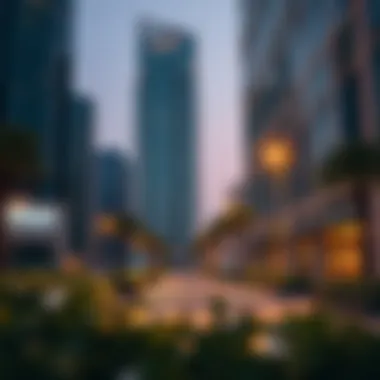

As cities evolve, the incorporation of modern technology into public services becomes paramount. Dubai's initiatives in smart solutions are designed to enhance the quality of life for its residents while simultaneously streamlining government functions. Here, we will explore the critical elements surrounding public services and how they intertwine with smart solutions, showcasing their importance in Dubai's progress towards a smart city.
E-Government Initiatives
Digital Public Services
Digital public services represent a leap towards efficient governance. In Dubai, these services facilitate easy access to a plethora of government functions, from licensing to paying fines. One might wonder what makes digital public services so attractive. The answer lies in their convenience and speed. The platform allows residents to complete transactions from their mobile devices or computers without the need to visit physical locations.
A unique feature of these services is the integration with smart technologies. This allows residents to receive reminders for important deadlines and even updates on the status of their requests, making interactions smoother. The advantages are clear; decreased wait times and increased satisfaction among users stand out. However, one must also consider potential downsides, like the digital divide where not all residents have equal access to technology, which could create disparities.
Citizen Engagement Platforms
Another key aspect of public services is the citizen engagement platforms that Dubai has set in motion. These platforms act as a bridge between the government and its citizens. They offer channels for feedback,Queries and suggestions. Essentially, they empower the residents, allowing them to voice their opinions and engage in dialogue with officials, which contributes to the overall goal of building a participatory government.
The stand-out feature in these platforms is their user-friendly interface that encourages interactions. It's designed for easy navigation, making it approachable for all demographics, including the elderly or those who may be less tech-savvy. Advantages here include fostering transparency and trust between the government and the citizens, though challenges such as ensuring all segments of society contribute their voices remain.
Emergency and Safety Management
Smart Surveillance Systems
In a smart city like Dubai, safety can't be ignored. Smart surveillance systems are a fundamental part of emergency and safety management. These systems utilize high-definition cameras and data analytics to monitor public spaces and respond swiftly to incidents. The primary function of these systems is not merely to observe but to analyze – using algorithms to predict situations that may escalate into emergencies.
The key characteristic of these surveillance systems is their real-time monitoring capabilities. This enables faster response times during crises, thereby enhancing public safety. A major benefit of established systems is that they can reduce crime rates and facilitate law enforcement operations. However, on the flip side, privacy concerns arise, as citizens might feel like they are constantly being watched.
Disaster Response Technologies
Living in an area prone to extreme weather changes necessitates robust disaster response technologies. Dubai has integrated advanced systems that enable quick responses to natural disasters or emergencies. These technologies encompass everything from predictive analytics to communication systems that keep residents informed during crises.
A hallmark of these technologies is their interoperability; they work seamlessly with various agencies, ensuring everyone is on the same page. This not only saves valuable time but also aids in resource allocation during disasters. The benefits are quite evident—efficient coordination can save lives and reduce damage. Nevertheless, reliance on such technologies can also pose risks, such as system failures or cyber threats.
In summary, the role public services and smart solutions plays is pivotal in shaping the overall efficiency and safety of Dubai, transforming it into a model for cities worldwide.
Key takeaways include the importance of accessible digital public services and the engagement of citizens through technology, along with the necessity of advanced safety mechanisms in urban living. These components work in tandem to foster a city that is not only smart but also responsive to its respective population.
Data and Privacy Concerns
In today’s rapidly evolving digital landscape, data and privacy concerns stand at the forefront of discussions around smart cities. As Dubai embraces its smart city initiative, the integration of technology into everyday life raises pressing questions about how citizen data is collected, stored, and used. For investors and residents alike, understanding how Dubai addresses these concerns is fundamental not just for compliance, but for trust in the systems that underpin the city’s ambitions.
The intricate web of city management systems relies heavily on data-driven models, making the need for robust privacy measures essential. This section delves into the mechanisms of data collection and the safeguards that protect users, ensuring that while technological progress flourishes, the privacy of residents remains a top priority.
Data Collection Techniques
Data collection in a smart city like Dubai involves several sophisticated techniques that range from direct citizen engagement to passive data gathering through sensors and IoT devices. The following methods are commonly employed:
- IoT Devices: Smart meters, traffic cameras, and environmental sensors continuously gather real-time data. This helps city officials make informed decisions about resource allocation and urban management.
- Mobile Applications: Many services have integrated apps that not only provide convenience but also collect data on user behavior and preferences. An example is the RTA Dubai app, which helps manage transportation while gathering valuable insights on public transport usage.
- Social Media Analytics: Platforms like Facebook and Twitter are monitored to gauge public sentiment and identify emerging issues that require attention.
While these methods are beneficial, they raise legitimate concerns about how much data is collected and who has access to it. In a city as interconnected as Dubai, a fine line exists between beneficial data use and invasive practices.
Protecting User Privacy
With a complex ecosystem of data collection, protecting user privacy is of paramount importance to the government of Dubai. Several initiatives are in place that help to uphold the rights of citizens while still reaping the benefits of a smart city framework:
- Strong Data Privacy Laws: Dubai has implemented strict regulations governing data protection, ensuring users have the right to understand and control how their data is used. The UAE’s Federal Law on Data Protection is a cornerstone of these measures.
- Transparency Initiatives: Clear documentation is provided to citizens about data usage policies. Information campaigns explain how data is collected, its purpose, and the measures in place to ensure security.
- Advanced Cybersecurity Measures: Utilizing encryption, firewalls, and regular audits, Dubai strives to protect sensitive information from breaches and unauthorized access. This is crucial not just for citizen privacy but for maintaining international investor confidence.
"Privacy is not just a right; it is the foundation upon which trust is built in a digital society. Dubai understands that without this trust, the smart city initiative could falter."
Economic Implications of a Smart City
Understanding the economic implications of Dubai's transformation into a smart city is paramount. This topic not only sheds light on project sustainability but also the vitality of resource allocation and long-term investments. A smart city framework serves to boost local economies, attract foreign investment, and directly enhance the quality of life for its residents. It involves reevaluating various economic sectors, including real estate, tourism, and technology, as they adapt to new digital paradigms.
Attracting Foreign Investment
The strategic approach Dubai takes to attract foreign investment has played a pivotal role in its smart city agenda. By creating an environment conducive to business, Dubai sends a clear signal to global investors. Factors such as tax incentives and simplified legislation create an appealing landscape for foreign capital. The presence of significant technological hubs, such as Dubai Internet City, has further solidified its position as a prime destination for investors.
“Foreign investment amplifies economic growth through enhanced job creation and innovation.”
Moreover, foreign companies looking to tap into emerging markets find Dubai's infrastructure and connectivity appealing. Improved digital frameworks not only smoothen logistical operations but also enhance scalability for businesses. Startups, backed by international investors, are more likely to flourish in a well-connected, technologically advanced environment, which is exactly what Dubai aims to provide.
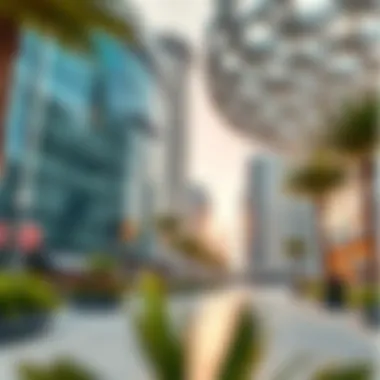

Impact on Real Estate Market
The burgeoning smart city initiatives in Dubai have had a marked effect on its real estate market. With advancements in technology and infrastructure, property values experience fluctuations that reflect new development trends. The integration of smart homes and buildings equipped with advanced digital features attracts buyers, presenting an interesting shift in traditional property valuation.
Trends in Property Values
Property values in Dubai exhibit a rising trend, largely driven by the advent of smart technologies integrated into residential and commercial spaces. With homes now outfitted with IoT devices that enhance energy efficiency and security, the demand for these properties has surged. This phenomenon boosts overall property values, showing potential homeowners a clear advantage of investing in new smart developments.
This rise in values makes a compelling case for both local and international investors. The unique selling proposition of these smart properties is their guarantee of a greener lifestyle, coupled with lower utility costs. However, it is essential to be mindful of the premium that such properties often carry, which may not align with everyone's budget.
Investment Opportunities
Investment opportunities in Dubai's smart city framework are expanding rapidly. Investors can look into various sectors, ranging from high-tech startups to urban infrastructure. There’s a noticeable shift towards projects that promise sustainability and innovation, aligning with global trends toward environmentally conscious investing.
Unique features of investments in smart city projects include smart energy management, advanced transport solutions, and cutting-edge telecommunications. While these projects can initially require considerable investment, their long-term returns are often attractive, making them worthwhile ventures. Yet, one must consider the associated risks, including technological obsolescence and fluctuating market demands.
Challenges Faced by Dubai as a Smart City
Navigating the complexities of becoming a leading smart city presents unique challenges for Dubai. While the advancements in technology and urban planning boost its global standing, they also expose vulnerabilities. Understanding these hurdles is vital for residents, investors, and real estate professionals. Addressing such issues ensures the seamless integration of innovation into daily life and improves how services are delivered.
Technological Barriers
Dubai's ambitious transformation into a smart city is hindered by several technological barriers. This includes outdated infrastructure that struggles to keep pace with new innovations. While the city thrives on cutting-edge tech, there’s a necessity for a robust digital backbone that supports everything from autonomous vehicles to smart public services.
- Integration Issues: Connecting old systems with modern technology can be like trying to fit a square peg into a round hole. The diverse range of technologies used in various sectors can clash, causing inefficiencies.
- Funding and Investment: Initiating technology-heavy projects often requires substantial investments. Convincing stakeholders to put money into high-risk innovations can be a daunting task, especially when potential returns are uncertain.
This is where collaboration plays a mitigating role; partnerships with tech companies can help bridge gaps. Initiatives like the Dubai Future Accelerators program are examples of efforts that aim to address such issues through fostering innovation in a controlled ecosystem.
Social and Economic Disparities
In the midst of rapid technological advancements, the growing social and economic disparities pose significant challenges. The gap between those who have access to the latest smart technologies and those who do not is widening. Such disparities could potentially hinder overall growth.
- Digital Divide: Not all residents possess the same level of digital literacy. This gap can lead to divided communities, with some benefiting from technological advancements while others languish behind.
- Affordability of Smart Solutions: Implementing smart solutions can come with hefty price tags. As a result, lower-income residents may find it challenging to access essential services that are increasingly based on digital platforms.
It's crucial for the government to address these inequalities proactively. Public-private partnerships can ensure inclusiveness in the city’s tech advancements, ensuring that benefits are shared across all strata of society.
"In the race to be a smart city, Dubai must not overlook its people. The technology impacts all, but only if it's accessible to everyone."
By tackling these challenges head-on, Dubai can ensure its position as a frontrunner in the smart city landscape while creating a more equitable environment for all.
For more information on the challenges faced, you can refer to resources like Wikipedia or Britannica for broader context.
Future Outlook for Dubai's Smart City Aspirations
The future outlook for Dubai's smart city aspirations is not just a matter of adopting new technologies; it is a commitment to creating a holistic environment where innovation drives everyday life. As a melting pot of cultures and ideas, Dubai stands on the brink of revolutionary projects that could transform not only its skyline but also its residents' experiences. An essential aspect of this vision is ensuring that advancements do not come at the expense of social equity or environmental sustainability.
Future endeavors aim to harmonize the capabilities of technology with the needs of its citizens, making Dubai not just a city of the future but a living organism in which all elements function in concert. This creates benefits across the board, from improving public services to boosting economic growth. Understanding the trajectory of these developments can guide investors, urban planners, and expatriates who seek to engage with this evolving landscape—filling opportunities that attract international attention.
Upcoming Projects and Innovations
Dubai's commitment to innovation is exemplified in its pipeline of upcoming projects, many of which emphasize sustainability and cutting-edge technologies. Initiatives such as the Dubai Autonomous Transportation Strategy are already in the works to ensure that by 2030, a quarter of all trips in the city will be via autonomous vehicles, reducing congestion and lowering emissions. In addition, the Dubai 3D Printing Strategy aims to make Dubai the world leader in 3D printing technology by 2030, which can revolutionize construction, health care, and even art.
Moreover, the Dubai Urban Plan 2040 serves as a blueprint for urban development, prioritizing public spaces and community well-being while integrating smart technology seamlessly.
- Key Projects:
- Dubai Autonomous Transportation Strategy
- Dubai 3D Printing Strategy
- Dubai Urban Plan 2040
These projects are being driven by a desire not just to stay ahead competitively, but also to make everyday life more enjoyable and less frenzied.
Long-Term Vision
In the long run, Dubai’s vision goes beyond just being a technological hub. It aims to be a paragon of smart living, where technology facilitates community engagement and sustainable living. The focus is also on inclusivity, ensuring that all social strata reap the benefits of these advancements. This vision aligns with global sustainability efforts, committing to goals spelled out by organizations like the United Nations.
Key facets include:
- Promoting eco-friendly energy sources such as solar and wind.
- Enhancing public transport to reduce reliance on private vehicles.
- Implementing smart waste management systems to ensure effective resource use.
By prioritizing human aspects alongside technological advancements, Dubai is not only reshaping its infrastructure, but also its societal framework. These elements create an enticing prospect for expats and investors alike—illustrating a city that respects its heritage while boldly looking toward the stars.
"Vision without action is merely a dream. Action without vision just passes the time. Vision with action can change the world."
- Joel A. Barker
As we continue to look beyond the horizon, it's clear that Dubai's ambitions will set a template for smart city strategies worldwide, attracting attention from those eager to be part of this remarkable transformation.






